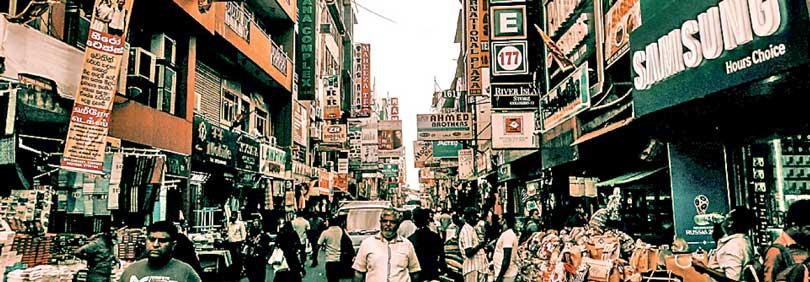Reply To:
Name - Reply Comment

Sri Lanka is in from a Capitalist transition
 The recently concluded Presidential and Parliamentary elections in Sri Lanka have resulted in a remarkable change in the composition of the political class that controls the State. In addition, the party system has undergone a major change. My interest here is to focus on the immediate context that led to these outcomes, and to make a few remarks on the importance of focusing on social policy for the new regime.
The recently concluded Presidential and Parliamentary elections in Sri Lanka have resulted in a remarkable change in the composition of the political class that controls the State. In addition, the party system has undergone a major change. My interest here is to focus on the immediate context that led to these outcomes, and to make a few remarks on the importance of focusing on social policy for the new regime.
New ideas on social policy have to be developed within a context of the politics of capitalist transition. Capitalist transition is a historical process that involves changing institutions, or the ‘rules of the game’, so that markets become the primary mechanism for resource allocation. These changes must be legitimised at an ideological level. When institutions to establish markets are successful, they become ideas that seem to be natural and of common sense, creating a hegemony. The establishment of the hegemony of markets is not a technocratic process, but a political process. Conflicts and struggles are always a part of this. This is also true in developed capitalist countries at present.
The process of capitalist transition takes place in a particular society with its own history. This means that capitalism is not some sort of a model. It is shaped by political struggles and historical processes in a particular context. This historical process varies from country to country. This explains the diverse trajectories of the evolution of social policies, for example,in developed capitalist countries.
Capitalist Transition in Sri Lanka
The Sri Lankan process of capitalist transition has gone through significant changes since 1977. The new policies emphasised the private sector, markets and openness to global capitalism. It was a significant shift from the state-dominated capitalism that had prevailed before. The regime led by the UNP began this process. Later on, the other major political formation led by the SLFP accepted it. In other words, there was a consensus among the political elite on these policies.
More than four decades of liberal capitalism have had a significant impact on the socio-economic structure. If we focus on a few of the major changes, we see that the bulk of the economy is concentrated in the Western Province, which was better endowed to benefit from the new direction of the economy. Central Bank data shows that in 2019 these areas accounted for around 39 per cent of the total national output. The same survey shows that 11.9 per cent of households in Sri Lanka live below the official poverty line. There is a great degree of variation in this indicator between districts. While Colombo District had 1.8 per cent of households below the poverty line, in Mullativu District in the Northern Province, it was as high as 39.5 per cent of households. This area has also been affected by three decades of armed violence.
Decline of Agricultural Economy
With the deepening of capitalist relations of production there have been major changes in the agrarian sector. The share of agriculture in the economy has significantly declined. In 1977, 30.7 per cent of the national output was from agriculture. By 2022 it had declined to 8.7 per cent. There has been a gradual deterioration in the viability of smallholder paddy. The 2019 Household Income and Expenditure Survey shows that only 8.6 per cent of income in the rural sector was from agriculture. The other side of this rural transformation is the growth of a population depending on wages. The growing working class is found in many socio-economic formations - organised, informal, sub-contractors, etc. Some sections of the working class sell their labour in other countries. While the working class has grown, institutions that protect their rights and working conditions do not operate in many sectors. What existed in the past has been gradually dismantled.
In a situation where wages have become a major source of income, education and skills development becomes a critical area for social mobility. Since the state monopoly on education was broken in the new period of capitalist transition, the role of the private sector in education has expanded. This has become a new avenue where richer classes can ensure an education for their children. In addition, the state sector is not an equal system. Therefore, both private sector education and state education provide more opportunities for the richer section of population to provide a quality education for their children.
The overall outcome of this has been the growth of a highly unequal society. Data from the 2019 Household Income and Expenditure Survey shows that in 2019, while the richest 20 per cent of the population acquired 51.4 per cent of national income, the poorest 20 per cent had only 4.6 per cent. These numbers are only the beginning of discussion of inequality, which has a wide-ranging impact on societal and political processes.
During the period immediately preceding the 2024 elections, Sri Lankan government’s inability to fulfil the demands of global financial capital led to an economic crisis with massive political and social repercussions. The incumbent President had to resign, and the political elite from different fractions combined to stabilise the situation. This was followed by the same state repression that we have seen on many occasions, and an agreement with the IMF to stabilise the economy.
High Expectation from Public
Given the context within which the current regime came to power, dealing with social policy issues will be a major expectation of the electorate. Since we do not make policies in a historical vacuum, the regime will have to take into account socio-economic impact of more than four decades of liberal capitalism outlined above. Then, it is necessary to identify the needs of the underprivileged earning a living in diverse socio-economic formations. In doing this we need to remember the special needs of certain groups, such as women and those affected by war. A survey of these diverse socio-economic formations will reveal various needs. A closer look at these can help to identify strategic needs and the elements of a new social policy.
This policy making process will have to deal with the question of public finance and finding adequate resources for these policies. Here, a twin strategy of stabilising the economy with the support of the IMF on one hand, and discussions with donors who are sensitive to social policy issues would help. Sri Lankan government has a rich tradition of such efforts, and the regime could build on that tradition.
Sunil Bastian is a political economist, author, and an Advisory Network Member of Verité Research. His current research interests are the politics of state formation and the development of capitalism in Sri Lanka. He has published widely and is the author of several books, including ‘Power and Politics in the Shadow of Sri Lanka’s Armed Conflict’ (2010).